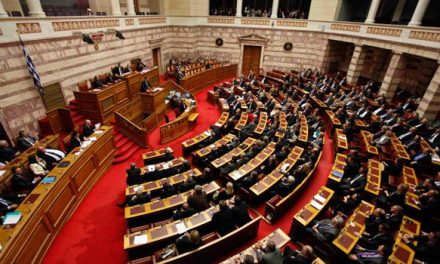Read the Weekend Roundup by The WorldPost
As the West fragments, China cements a path ahead
While rough-and-tumble political battles may rage within the great tent of China’s 88 million member Communist Party, the aim of its political process is to unify the body politic in order to put a steady wind under the wings of policy decisions that, to be effective, must be carried out without a break in continuity over the long term. It is this core attribute of Chinese governance that has raised some 600 million people out of poverty in only 30 years, not to speak of other impressive accomplishments such as building a vast high-speed rail network along with other infrastructure to modernize a backward country in record time. Within this strength, of course, resides China’s chief flaw: erring on the repressive side of order over freedom to avoid fraying of the consensus.
By contrast, the Western adversarial system of competitive elections divides the body politic against itself at the cost of consensus and long-term continuity in governance. In the Netherlands, the surging anti-immigrant partisans of Geert Wilders were kept in check only by the governing centrist party migrating rightward and the splintering of the rest of the vote across many parties through proportional representation. Some 28 parties competed in this election, many of them “pop-up parties” focused on one issue. Within this strength of diverse participation lies its flaw: the growing inability to forge a governing consensus out of the exploding cacophony of voices and interests. And, as we’ve seen in the United States on policies ranging from Obamacare to climate change, when all-out competitive partisanship destroys consensus among the body politic, the democratic transfer of power can mean a complete rupture from policies endorsed by most voters only four years earlier.
Writing from Copenhagen about the Dutch elections, Flemming Rose, the Danish editor who sparked worldwide protests by publishing cartoons of the Prophet Muhammad, condemns the anti-Islam extremism of Geert Wilders, who has called for banning the Quran. Marking the difference between liberal democracy and the authoritarian bent of populism, Rose writes that the “essence of tolerance” means “you do not ban, intimidate, threaten or use violence against speech that you deeply dislike or hate.”
Kaya Genc reflects from Istanbul on the anti-Islam climate in Europe in the context of the Dutch election, the Turkey-Netherlands spat and the “barbarian” stereotype of Turks he experienced while a graduate student in Amsterdam. “As someone deeply weary of jingoism and the political rhetoric of patriotism, I had long disliked Turkish identity politics,” he recalls of his mindset as a student. “And yet, it was also in the Netherlands that I’d realized the uncannily inescapable power of national and religious identity ― of the misery of being pigeonholed into categories inside which I couldn’t help but appear to Europeans.”
Maastricht University’s Jacques Paulus Koenis takes a deeper look at voter discontent in the Netherlands. “The so-called ‘losers of globalization’ are not the only ones who vote for Wilders these days,” he writes. “Nor do these voters in many cases seriously believe that Wilders should rule the country. What matters is that he is tapping into the anxieties of many voters.” As Koenis sees it, those citizens believe that Europe’s intrusive political elites and new migrants are “undermining Dutch culture.” He concludes: “Nostalgia is what moves them into the belief that new Dutch dikes are needed: to keep an ever-more-threatening outside world out of this low country.”
Meanwhile, back at the Great Hall of the People in Beijing, delegates from around China who gathered for the annual “two sessions” of that vast nation’s legislative and consultative bodies are looking ahead, not back with nostalgia. Reflecting on those gatherings, Fred Hu sees “no earth-shattering bold initiatives,” but only the three “C’s” of “caution, consistency and continuity.” In the face of global uncertainty, not least the rising protectionist sentiment in the U.S. that would dismantle the trading system upon which China’s prosperity was built, Hu writes from Beijing that China is prudently targeting “a growth rate realistically achievable by the expansion of domestic demand alone.” Akshay Shah, also writing from Beijing, argues that China’s economy won’t surpass the U.S. for at least another 10 to 15 years.
Jeremy Goldkorn describes how the annual meetings that took place this week in Beijing play an important role in shaping the political agenda, albeit guided by the Communist Party, while also educating public opinion on key issues of policy through their highly-publicized proceedings. As Goldkorn reports, one impassioned topic of debate over a new civil code would be familiar to most Americans: balancing the rights of women with those of the fetus.
Writing from Hong Kong, Jean-Pierre Cabestan has few kind words and many harsh ones for China’s system of governance. Echoing populist sentiment sweeping the West, he writes that “the unchecked powers and accumulated privileges of the ruling elite have exacerbated a sense of injustice.” As Cabestan sees it, “the [Chinese Communist Party] no longer represents the workers and peasants” and corruption has not diminished, despite President Xi Jinping’s ballyhooed campaign, but only “become more discreet.”
This interactive graphic prepared by WorldPost editor Peter Mellgard using a U.S. government data base visualizes China’s jailed, murdered or missing political prisoners.
In an episode of “My Life, My China” produced by WorldPost’s partner in Shanghai, Guancha.cn, Ye Qinglin couldn’t disagree more with Cabestan’s sweeping negativity on his country and the political prisoner data that comes along with that. In this video Ye describes how he rejected a lucrative offer from the BBC, for whom he had worked, to make a documentary about “miserable conditions” of coal miners being exploited or peasants whose lands were seized to make way for the Olympics. Offended, he returned home for good in 2005, shed “Western standards” and began reporting instead on the “real China” about which he says there are many more positive stories to tell.
Part of that real China is an effort by a small city in Shandong Province to go carbon neutral. As another reporter, David Biello writes, the men and women who govern Rizhao are seeking to change the course of “heedless growth” that has blanketed the country in pollution to make their city one of the first in China to achieve a “circular economy” where waste is turned into clean-burning fuel.
Writing from Hong Kong, Tom Phillips tells U.S. President Donald Trump that he should heed the lessons from China’s bad experience of building the celebrated Great Wall. It was built on xenophobic principles, he says, and ultimately doomed an entire dynasty.
As Trump’s Muslim-focused travel ban was blocked yet again, Christopher Mathias and Omar Kasrawi tell the tale of a gay refugee lawyer who helped fight it. When asked what the ban means to him as a refugee, Luis Mancheno, who fled from Ecuador to the U.S. for safety, said: “Closing the door to the people that need help the most is one of the cruelest, anti-American things that this government could have done. If I wasn’t allowed to come here as a refugee, I wouldn’t be alive today.”
Mouhanad A. Al-Rifay has a similar gratitude for America. Now based in Trump’s Washington, Al-Rifay came to the United States with his family as an asylum seeker in 2005 after direct death threats were made against them by Syrian President Bashar Assad’s regime. Though the U.S. president’s ban made him worry that he might have to flee hatred in his new home, the new American citizen says the nationwide outcry against this and other xenophobia have made him feel more safe and thankful than ever before.
Rami Adham, the so-called “toy smuggler” from Aleppo now based in Finland, is also thankful to have escaped the horrors of Syria, but returns to help ease the pain of those who are still there “living in a nightmare” with toys and other aid. On the eve of the 6th anniversary of the country’s uprising, he offered a mixed tale of hope and despair from Idlib ― where coming “to America is the last thing on people’s minds” ― and called on Trump and populist leaders in Europe to put an end to the long conflict. “While you have lived in beautiful towers engraved with your name, the people you are trying to keep out have been living under the dictatorship of one regime … that has dictated their future by killing hundreds of thousands of those closest to them,” he says.
The Future of Life Institute’s Ariel Conn this week explores whether AI will worsen income inequality as workers are demoted or displaced. Most agree, she writes, that it will exacerbate the problem.
Finally, our Singularity series this week reports on a major advance in the creation of synthetic life as scientists for the first time have succeeded in creating what is commonly known as Baker’s yeast from scratch.



















